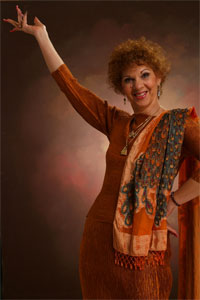What do you get if you cross a passionate black actor with a defiant white musician? Well, if you’re very lucky, you may end up with the extraordinary Cleo Parker Robinson – dancer, teacher, pioneer, social conscience, never-take-no-for an-answer; and founder of an eponymous dance troupe that is considered one of the top modern dance companies in North America
This dynamo from Denver, Colorado, will be whirling into Toronto (“We’re thrilled to come,” she enthuses) from May 29 through June 8, along with 13 members of her ensemble, to present two full-length performances and a week of dance workshops as the featured artiste of danceImmersion’s annual Showcase. Dance Immersion is a Toronto-based organization that supports dancers and dances of the African diaspora – which makes it a perfect match for Robinson, whose approach to the art form fuses the rigor of classical and modern dance training with the passion and dynamism of indigenous African dance.
Born in 1948, Cleo Parker Robinson was the child of a struggling black actor and a white mother whose parents thwarted their daughter’s dreams of becoming a professional musician, but could not prevent her from marrying the man of her choice -- in defiance of the stringent colour barriers of the time. “She had to deal with racism on every side,” recalls Robinson.
She credits her father’s influence for her early fascination with the theatrical arts; but Robinson has also clearly inherited her mother’s unshakeable determination. Overcoming a life-threatening illness at the age of 10, she threw herself body and soul into dance and by 15 was working as a substitute dance instructor at the University of Colorado.
She completed a BSc. in psychology and dance at what is now Denver University, and in 1970 founded the Cleo Parker Robinson Dance Ensemble.
It is a testament to Robinson’s talent and charisma that some of her original dancers remain part of her organization -- her “family”, as she considers it -- to this day. Notable amongst these is premiere dancer Marceline Freeman -- now in her fifties -- who, struck by blindness three years ago, will be dancing on tour for the first time since her misfortune, when they appear in Toronto. “We need to realize that healing has a critical place in art,” Robinson points out.
The founder of CPRDE has achieved much over the years; she has performed around the world and studied with some of the great names in American modern dance – Alvin Ailey and Merce Cunningham, for example. Hers was the first repertory dance company in the region, and the first to get federal funding for its programs, which include a full-time dance school, an international summer institute, and an extraordinary 12-week outreach program, Aye (a Yoruba word, pronounced Ah-Yay), aimed at bringing art into the lives of at-risk youths.
Awarded an honorary doctorate from the University of Denver in 1991 and named to the Blacks in Colorado Hall of Fame in 1994, Robinson says one of the highlights of her life was being appointed by President Clinton to the National Council on the Arts in 1999. “To be in Washington, and to be respected as a voice; and also my journey as a dancer,” she recalls. “I was the only dancer on the Council.”
Her heroine and touchstone is the legendary Katherine Dunham, who revolutionized American dance in the 1930s with the concept of ethno-choreography, drawing on the folk heritage of Africa and the Caribbean – an approach that has greatly influenced Robinson’s own choreography. “She was a great inspiration to me and I love her very much,” says Robinson, whose dance school and company both reflect her commitment to multiculturalism and diversity. “She taught us that dance is a way of life.”
For Robinson herself, dance is much more than just a way of life; it is also about social consciousness and personal redemption. “I’ve choreographed works that I felt made a social statement,” she says. “As a black dancer and choreographer growing up in Denver, I felt it was important that we discover our roots. Art for art’s sake is marvelous, but I don’t think we have that luxury. … I believe we work to make art absolutely entertaining, delicious and delightful; but I do believe that there is an obligation to use art as a path to a higher consciousness. I think that is how we can make a difference in the world.”
But don’t make the mistake of thinking that Robinson’s work is grimly ideological, concerned with uplifting messages and nothing else. Quite the opposite. “Dance,” she says, “has a lot of joy, and that is my goal: to get through the darkness and get to the light as quickly as we can.”






